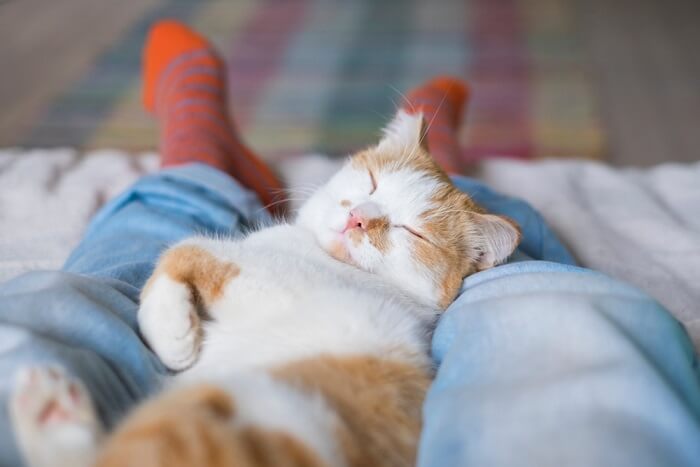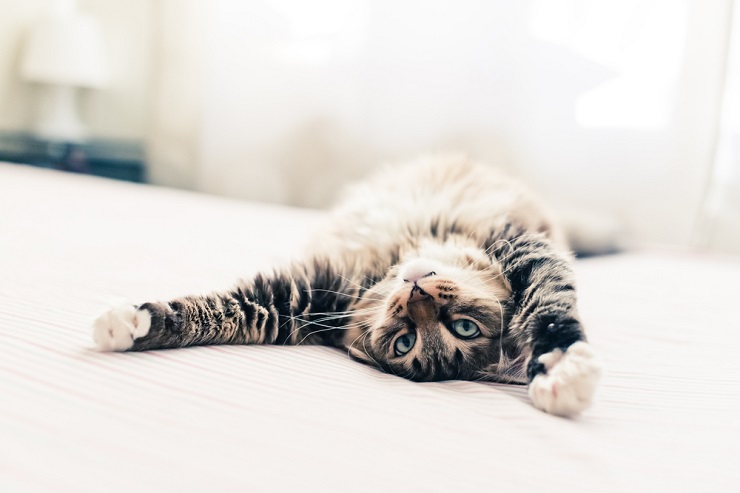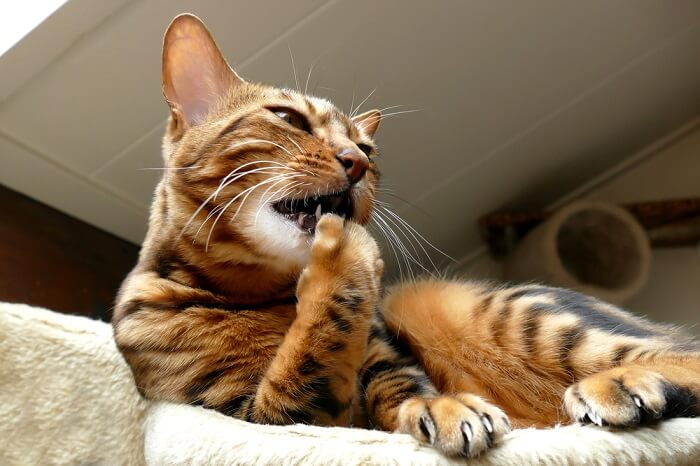Why Is My Cat Growling? 6 Reasons You Should Know
This page contains affiliate links. We may earn money or products from the companies mentioned in this post through our independently chosen links, which earn us a commission. Learn More
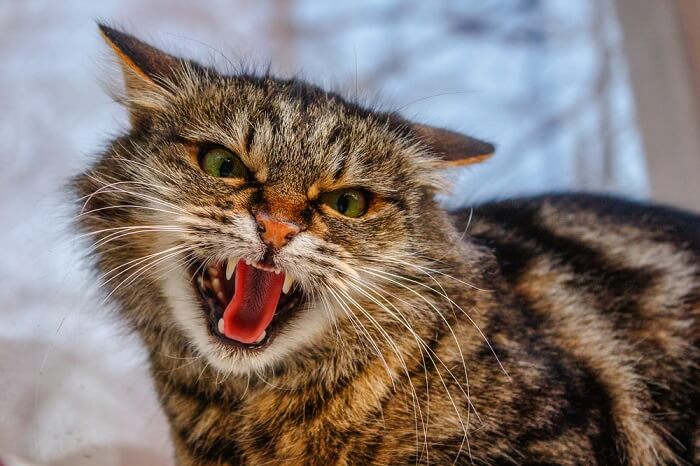 The full gamut of the sounds a cat can make is quite wide. From purring, we all know and are fond of, all the way to hissing that is an unmistakable warning sign.
The full gamut of the sounds a cat can make is quite wide. From purring, we all know and are fond of, all the way to hissing that is an unmistakable warning sign.
A person not familiar with cats and their behavior would also describe growling as a token of discomfort, anger, and agitation. However, we cat lovers know that this isn’t necessarily the case.
How To Recognize A Growl?
Since a cat’s vocal cords can produce a variety of sounds, it can sometimes be difficult to distinguish a cat growling from a cat snarling. The main characteristic of a growl is the depth of sound, as air passes through the animal’s vocal cords.
This rumbling noise is actually quite similar to the growling of a dog, which is more recognizable. When your feline is truly pissed, the growl, which can last for several seconds, will be succeeded by a big hiss. The cat’s entire body language is telling you to back off.
Growling As A Warning Noise
If you wish to understand why cats growl, just take a look at the situations when we humans let out a similar sound. A person getting ready for work who hasn’t had their morning coffee growls like a cat when someone addresses them in a loud voice.
In most cases, growling is a sign of agitation, i.e. that something occurring in the real world does not sit well with your feline pet. For instance, a stranger approaching a cat in a vehement manner is one of the most common reasons for a cat growling. We cat lovers know better than to make sudden motions in front of our four-legged furry friend.
When interacting with humans, growling is a clear warning sign instilled by Mother Nature to unmistakably confer the emotion of anger, annoyance, aggression, and ultimately, fear. We would simply say “hey, back off stranger,” while a cat would growl.
Do Cats Growl At Each Other?
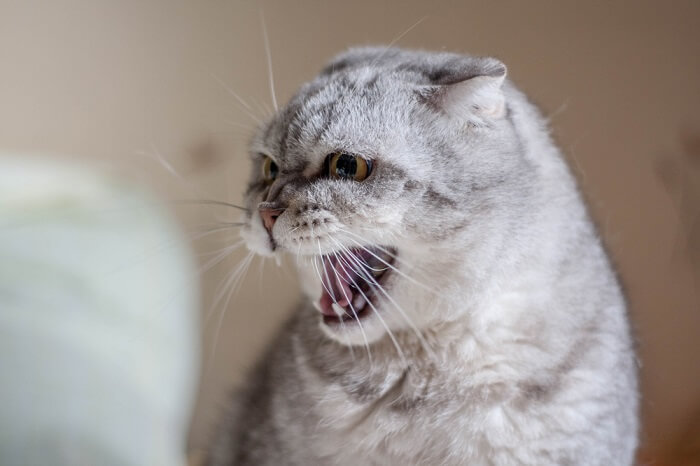
Moving onto relations between cats, do they use the same vocals to communicate among each other? The answer would be yes, as growling has a similar role like the one when interacting with humans.
Cats growl at humans to drive us off, while they growl at other cats (and dogs) to establish dominance. Also, a cat growling at another cat may simply mean they are grumpy and don’t want the company of another animal. So relatable!
Do Cats Growl When In Pain?
Again, the short answer would be yes. When cats are experiencing physical pain, such as a trauma or a urinary tract infection, they might growl at others. In most cases, owners are aware of the problem, so they understand why their cat is constantly growling.
However, in some cases, growling can actually save a kitten’s life as such behavior will force the owner to take their pet to a veterinarian. The more consistent the seemingly unprovoked growling, the greater the chances that your pet might have an underlying physical ailment.
Is Cat Growling A Form Of Communication?
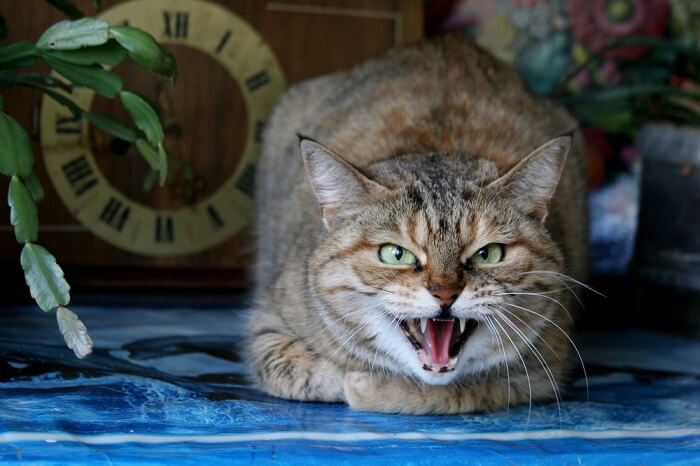
When we set aside aggression and pain, a logical question arises: do cats communicate through growling? Just like humans, cats have been known to over exaggerate. For instance, if you forget to pour water in their bowl, they will sometimes growl instead of meowing just to accentuate the degree of their discontent.
In this aspect, some cats can be real drama queens and growling is their way of saying “pay attention to me!” Over time, caring pet owners learn to distinguish between a painful/aggressive growl and an overreacting growl. As professionals, veterinarians can also easily tell if a cat is agitated or it is growling to draw attention to itself.
The Proper Response To A Cat Growling
If you encounter a cat in the street and it growls at you, you better walk away. Surprisingly enough, the response doesn’t change much when it comes to your cat. Neither comforting nor scolding the cat will yield any results, as growling is a natural instinctual reaction that you can do nothing about.
In fact, if you attempt to physically interact with the cat, you will only escalate the situation, so you might end up with a nasty scratch or a bite mark. Truth be told, it would serve you right for blatantly disregarding the warning signs.
In Conclusion
Contrary to popular belief, there is more than one reason a cat would growl. Traditionally, growling is associated with a feeling of discomfort and anger, so don’t try to caress a growling cat.
However, if your pet cat has been growling for days, it might be in pain. Finally, cats have been known to growl for no particular reason, which means you have been neglecting your feline friend recently.
Frequently Asked Questions
What does it mean when a cat does a low growl?
As we have explained already, a growl is a deep voice, so a low-pitched growl simply indicates the degree to which your cat is perturbed. Nevertheless, it is still a warning sign, warding off a potential threat or a pushy human wannabe cuddler.
What does it mean when a cat is growling?
Simply put: the animal is angry. Growling is usually accompanied by hissing and the cat can easily become aggressive. Mind you, some cats growl when they are in pain or when they want more attention from their owners.
Why is my cat growling and acting weird?
If your cat has been hissing and acting strangely for a while, then they might be in pain. Apart from aggravation, cats tend to growl when they are sick. Any number of illnesses, from a dental condition to metabolic diseases can cause your cat to act erratically. Taking it to the vet is the best course of action to take.
How do you calm a growling cat?
A growling cat is best not approached. Trying to appease it by stroking it is a bad idea, as they can bite a person when agitated. Once the cats start growling, leave it alone so it feels as if it’s in a safe environment. Once this happens, it will stop growling on its own and get back to its daily activities.

